
Home | Pioneers | Contact Us | Copyright/Disclaimer
John Robinson
c1836, Monaro District
(Last changed
Friday June 15, 2012)
Historical Information | Genealogy
Documents and photos contributed by Ian Harvey <iansharvey-at-bigpond.com>
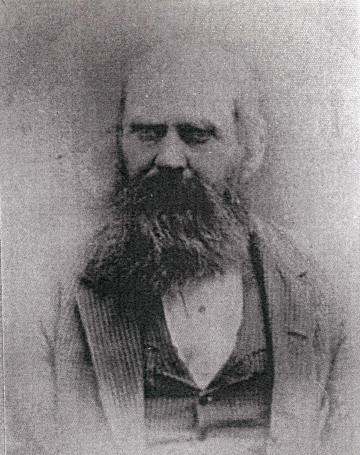 |
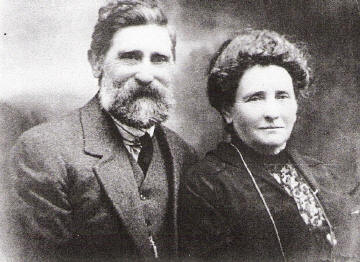 |
John Robinson |
|
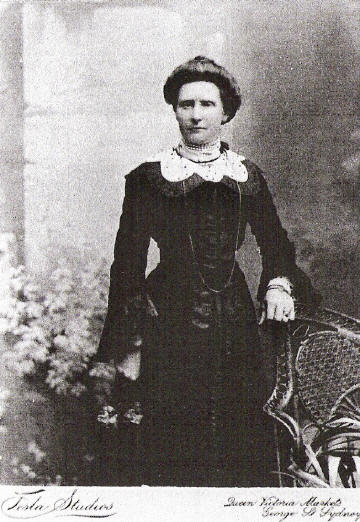 |
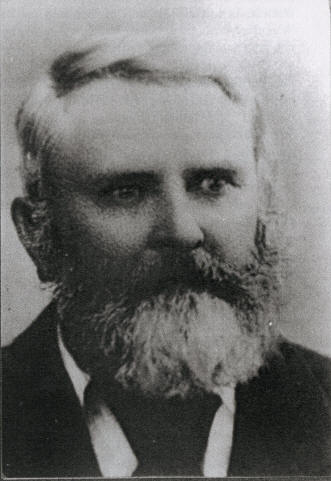 |
Maria Grant nee Robinson |
|
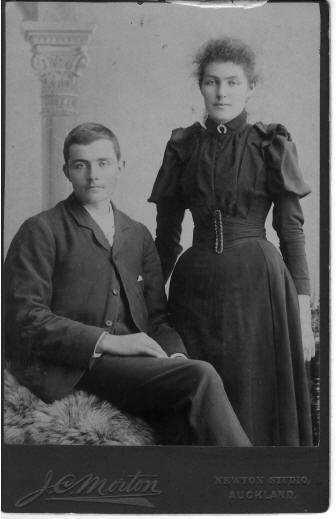 |
|
Arthur Robinson and Elizabeth Grant |
|
%20and%20John%20Robinson.jpg) |
|
John Robinson and Jeannette Grant
|
Jeannette (Jenny) Robinson nee Grant
|
|
|
|
| Thomas Brown Collins and Mary Maria Robinson
|
Martha Collins
|
| These last 2 photos were contributed by Gay Woollett [mardy_w-at-bigpond.net.au] |
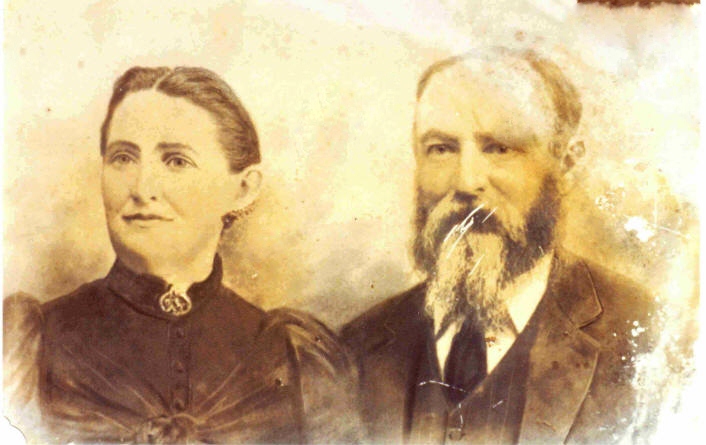 |
|
|
|
|
Early Days Memories of Growing Up – Marge Chapman – Aunty Marge Supplied by Jeff Robinson [jeff.robinson@ozemail.com.au] Charles James Robinson aged 22 and Clara Stagg, 19 were married on May, 13th 1903. They went to live on his property “Stirling” a mixed farm about seven miles from Delegate, the nearest town. “Glencoe” owned by Grandfather Robinson, being their nearest neighbour. He lived there with three sons and two daughters . When Uncle Arthur married he went to Wagga to live and soon after, Benjamin left home to look for work. He kept in touch with the family for a while , but finally completely disappeared and was never heard of again. When Grandfather died, the youngest son Dick, who was about sixteen, came to live with us for a while before going to work on a neighbouring station. Dad managed our place and Glencoe for quite a while but finally it was sold. Dick became a shearer, the two girls, May and Sarah who were both good seamstresses went to Sydney and worked at Farmers, and David Jones. They both became expert dressmakers and finally set up business in Randwick, catering especially for the racing fraternity. May married a soldier during the war and when he returned from overseas they bought Sterling from Dad. They lived there until the house and contents were completely destroyed by fire. A new house was built on the old site. Wallace, I, Molly, Dick and May were born while we lived at Sterling. When Dick was born in 1909 mother was very ill. As soon as she was well enough to travel she went to Melbourne for a long holiday, staying with Grandma Stagg’s family who lived there. Wal was already in Wagga with Uncle Arthur. I went to stay with Aunty Bet and Molly stayed with Grandfather and the girls. Dad camped out at the Wolvera mine which he partly owned and it was many months before we were all home together again. Before Dad came home he made a trip to Wagga coming back with a mob of horses and a young Scottish groom named Jim to care for them. The most valuable horse was a Clydesdale stallion named Sir John Newton. They also brought Wal home at this time. Big Jack, as we called him, was a bad tempered brute and we soon learned to keep well away from his stable and yard. We loved Jim who taught us to ride and told us stories about Scotland. I remember once Big Jack got out of his yard, took one of the riding horses which as he galloped away caught his front shoe in a hind shoe and fell. Armed with the clothes prop Mother went over to protect the fallen horse. We ran backwards and forwards all day between the house and her. As it became dark we were sent back to get matches and a lantern and then told to stay home. We spent hours at the kitchen window, watching the little light across the paddock. The men came home at about ten o’clock and Jim soon had Big Jack back in his yard while Dad attended to the fallen horse. Jim spent most of his time with the young horses, breaking them in and getting then ready to sell. All this time there had been no school available. Wal had learned to read while he was in Wagga and Dad taught me at night but we were both well past school age. Several families got together and organized a subsidised school to be set up by the Victorian Government who provided a teacher. Parents provided the school building and accommodation . I started school on my eighth birthday, taking a cake to school and having a party. There were about twelve pupils and one teacher. Grandma Stagg lived about half way. We attended there for two years. When it was really cold we called half way at Grandma’s where she gave us a dish of hot water to thaw our frozen hands. Wallace, Molly and I went to that school. In 1914 Dad bought another property at Jincumbilly about sixty miles away and he and Jim moved down there and built fences and finally a temporary home for us to live in. We moved down in early 1915. This was a completely new area and with the exception of two farms, all were new settlers, several coming from Sydney. The land was completely flat with not a single tree in sight. Newcomers soon organized a post office and school but these were too far away to be of any use to us and once again we were without schooling until another subsidized one was arranged. This was held in a two roomed garden hut on a nearby farm. One room for classes and the other a lunch room and play room when it was wet. We had to cross the river to get to school and when it rained heavily we were ferried across by horse by the nearest neighbour. There were nine pupils and three families. Our first teacher was a keen horsewoman who stayed with us and spent her spare time trailing our horses, even riding in the local show. Jim, our groom had enlisted as soon as we were settled in. As next of kin we were later notified that he had been killed in action. Dad’s uncle nick came to care for the horses, especially Big Jack. Uncle nick lived in Bombala. He was Grandma Robinson’s brother, an old man with a Van Dyke beard. At first Dad worked at mixed farming again but when the railway lines were being built through Nimmetabel from Bombala be bought a butcher’s license and supplied the workmen with meat and vegetables which grew well in our soil. Old Nick’s son, young Nick lived with us at this time. He stayed until Wal was old enough to take over some of his chores. Wal hated all farm work, especially anything to do with horses. Later on Dad decided to start a dairy farm. He made a trip down to Bega where he purchased a herd of jersey cows and drove them up the mountain and soon we were in business. The stable block became the dairy with a generator and a separator to separate the cream. Dad, me Wal and sometimes Molly, milked by hand. Wallace took the cream to Bibinluke Butter Factory twice a week , a seven mile drive by pony and sulky. He hated it. During this time Dad took time off for a trip to Sydney, taking Molly, Dick and me to the Royal Easter Show. We stayed with the aunts and had a lovely time. Some time later Wal had his turn, going down by himself and also staying with the aunts. All the time we were at Jincumbilly we made occasional trips back to the old place, travelling by buggy and staying with the Johnson Family at Bendock They were always our very close friends. Years later when we lived in Sydney the two eldest boys, Walter and Bill, came to live with us while they worked to buy a house for their parents. Their father was a complete invalid by this time. When he was twenty two years old Walter went to live in America but bill remained a very good friend of the family all his life. In 1917 Wallace and I sat for our Merit certificate and we both passed. I passed high enough to go on to Fort Street Girls High School but there was no way that Dad would let me go to Sydney alone so my schooling was finished at twelve. In 1921 the local lads were starting to take an interest in our female population and dad decided it was time to move on. He went to Sydney for a short trip and on the advice of John Corbett, he purchased a timber cottage in Leichhardt . We sold the farm, the contents of the farm and the house by auction and landed in Sydney on Good Friday, 1922. Our new home was much too small for our large family but we hadn’t been there long when the big house opposite came up for sale and we moved across the street. This house had previously belonged to the Mayor of Leichhardt who was the father of ten children. It was built on a corner, on three blocks of land with a five bedroom house fronting Norton Street, stables and chook pen opening to William Street and a garage , carriage house and grooms quarters facing William Street. Some years later dad built a new house facing William Street, where the garden and orchard had been when we lived in the big house. Irene, Jack and Ruth were born in Bombala while we lived at Jincumbilly. Ruth was three months old when we moved to Sydney. Dad bought and operated a light engineering business in town . I went to work in the knitting department of Lerners menswear, going to business college at night to learn shorthand and typing. Wal did an apprenticeship as a motor mechanic. He met and became good friends with Harvey Ivers, a friendship which lasted all their lives. They later dabbled with making a radio set which worked quite well from half a walnut shell. Wal also met up with Hector Huggett at Tech. and years later they became business partners in Wingham. Molly went to work at Bonds Cotton Mills. May, Dick and later Rene went to Orange Grove Primary School and afterwards Dick went to Agricultural College. At seventeen he returned to Nimmetabel. Always he was a farmer at heart. When the depression became very bad, dad closed down the engineering business and started a fruit shop at home. He kept this until his death in 1934. In 1933 Dad became ill with whooping cough which he caught from the younger children. This aggravated a congenital heart problem which he had had from boyhood and after a short trip to the snow country which he hoped would cure hid cough he became seriously ill. He was admitted to Prince Alfred Hospital with pneumonia and pleurisy and later discharged with a terminal heart condition. He lived another eleven months, confined to the house. He died in hospital on Clyde’s fifth birthday 17th June, 1934, Immediately after the funeral Mum got busy and painted the whole house, her way of coping with grief. Jack left school at fifteen and started work. Rene at eighteen was already working. Times were hard and money was scarce for the next few years. Three stables were let as garages for a while and the groom’s quarters were lived in by a desperate family. These buildings were later sold to a factory. Lee, Ron and Clyde were born in Sydney. As I think back our period in Sydney was the happiest time of our life. We were all together, busy, and enjoying life. All too soon we were separated. Molly and may were married, Wal had gone to Wagga , I to Newcastle, Dick went to Condobolin to manage a property, Jack in the Air Force for five years , lee left school and started work as a cub reporter. He married at seventeen and went to Melbourne to work. He joined the Army when he was nineteen and was there for the next four years. Ron joined the Air Force at eighteen , straight from school leaving Clyde the only male at home. Grandma Stagg suffered a serious stroke in 1946 and spent the next three years being cared for by Mum. He sister Ida came from Victoria to help out. Rene and Ruth were settled at home. Rene had a ball meeting many Army boys. After the war years Rene and Ruth married and Mum stayed at home alone. (Clyde and his wife Lorna McLaughlan lived with her for some time after they were married) Eventually her home was bought by the Main Roads Board who had plans to widen William Street. She moved into a granny flat at Clyde’s and enjoyed watching the children grow up. She spent the last years of her life in a nursing home after having a stroke. She died in 1969. The family is now lessened by five. Wal, Molly, Dick, Rene and Jack having left us. The years in the big house were the best of our lives. Molly and I learned the piano and practiced when we had to. Wallace learned the violin and became good enough to play in the Sunday School Orchestra. The house was always full of people and fun. We played tennis on Saturdays and often brought the team home for tea and a sing song. The church to which we belonged didn’t have a hall so all social events were held in our house. Later Note: I always had a great love of horses . At Jincumbilly we lived two miles from the road. Wal or I had to go out the the road several times a week to collect the mail. I would walk to miles to catch the horse so that I could ride to the mail box. Wal on the other hand would walk the two miles even if the horse was close to the house. He hated horses. Some of my memories of Aunty Marge (and Uncle Merv.) Marge was not married until late 1934 or early 1935 when I was eighteen months old. I was the train bearer (flower girl) at the wedding. I don’t really remember this but photos show that it is so. I do have vague memories of a green dress which may have been saved . I do know that I always got along very well with her and from the time I remember our Sydney trips I always stayed with her. She first lived in a terrace house somewhere in Leichhardt. My memory is of a one story house with the hall down one side |
|